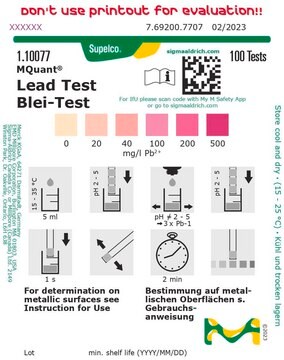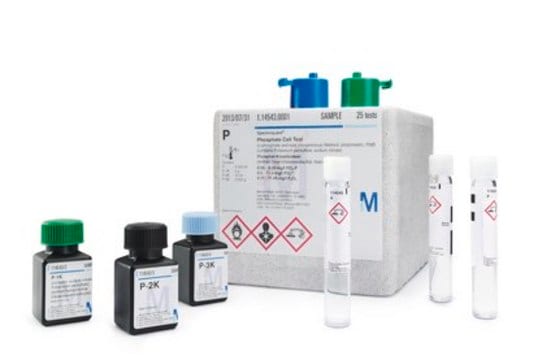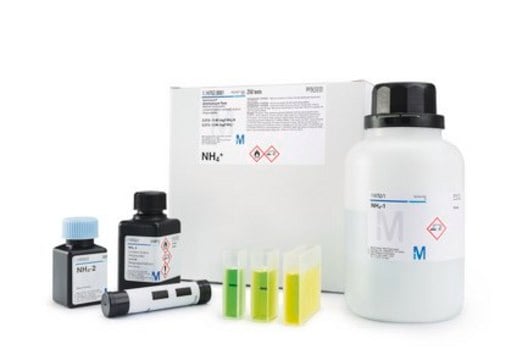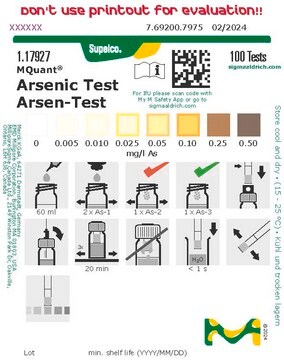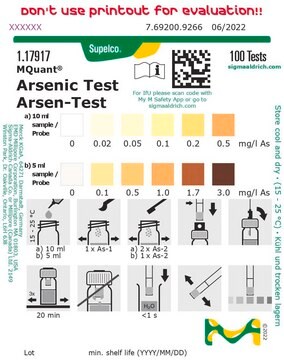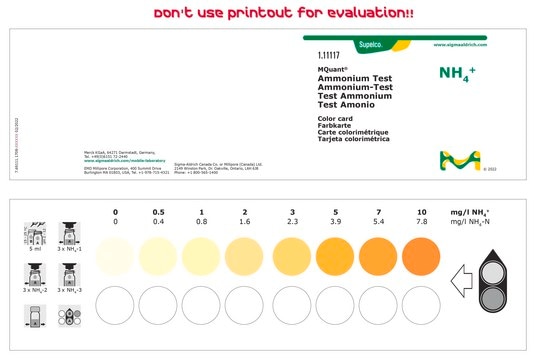1.09717
Lead Test, photometric
photometric, 0.010-5.00 mg/L (Pb), Spectroquant®
About This Item
Recommended Products
product name
Lead Test, photometric, 0.010-5.00 mg/L (Pb), Spectroquant®
product line
Spectroquant®
Quality Level
usage
sufficient for 50 tests
specific analyte(s)
lead
measuring range
0.010-5.00 mg/L (Pb)
technique(s)
photometry: suitable
compatibility
for use with Spectroquant® Move 100
for use with Spectroquant® Nova 60 A
for use with Spectroquant® Prove 100
for use with Spectroquant® Prove 300
for use with Spectroquant® Prove 600
detection method
photometric (PAR)
storage temp.
15-25°C
General description
This Spectroquant® Lead Reagent Test allows the accurate quantification of the lead(II) ions concentration in aqueous samples. To analyze undissolved or complex-bound lead the sample needs to be decomposed by digestion. Method applied: In alkaline solution lead(II) ions react with 4-(2’-pyridylazo)resorcinol (PAR) to form a red complex which is determined photometrically. The Spectroquant®Reagent Test Kits contain highly stable, ready-to-use reagent mixtures to perform the analysis according to the procedure described in the accompanying instruction leaflet. All our Cell and Reagent Test Kits are equipped with the unique Live ID (2D barcode) which allows seamless method recognition and contains essential information such as lot number, expiry date, and automatic calibration updates.
Application
- Simultaneous enrichment and speciation of lead and mercury by magnetic solid-phase extraction coupled to HPLC-ICP-MS: This study introduces a method using magnetic hydrazine-linked covalent organic frameworks for the detection and analysis of lead in various samples, highlighting its applications in environmental monitoring and material science research, essential for assessing heavy metal contamination (Zhang X et al., 2024).
Legal Information
Not finding the right product?
Try our Product Selector Tool.
Signal Word
Danger
Hazard Statements
Precautionary Statements
Hazard Classifications
Acute Tox. 2 Oral - Acute Tox. 4 Dermal - Acute Tox. 4 Inhalation - Aquatic Acute 1 - Aquatic Chronic 2 - Carc. 2 - Eye Dam. 1 - Met. Corr. 1 - Skin Corr. 1 - Skin Sens. 1 - STOT RE 2 - STOT RE 2 Oral
Target Organs
spleen, Thyroid
Supplementary Hazards
Storage Class Code
6.1A - Combustible, acute toxic Cat. 1 and 2 / very toxic hazardous materials
WGK
WGK 3
Regulatory Listings
Regulatory Listings are mainly provided for chemical products. Only limited information can be provided here for non-chemical products. No entry means none of the components are listed. It is the user’s obligation to ensure the safe and legal use of the product.
PDSCL
Please refer to KIT Component information
PRTR
Please refer to KIT Component information
FSL
Please refer to KIT Component information
ISHL Indicated Name
Please refer to KIT Component information
ISHL Notified Names
Please refer to KIT Component information
Cartagena Act
Please refer to KIT Component information
JAN Code
キットコンポーネントの情報を参照してください
Certificates of Analysis (COA)
Search for Certificates of Analysis (COA) by entering the products Lot/Batch Number. Lot and Batch Numbers can be found on a product’s label following the words ‘Lot’ or ‘Batch’.
Already Own This Product?
Find documentation for the products that you have recently purchased in the Document Library.
Customers Also Viewed
Protocols
Photometric determination with PAR subsequent to acid mineralisation; DIN decomposition
Photometric determination with PAR subsequent to separation of lead with Sodium diethyldithiocarbaminate.
Photometric determination with PAR subsequent to separation of lead with Sodium diethyldithiocarbaminate
Our team of scientists has experience in all areas of research including Life Science, Material Science, Chemical Synthesis, Chromatography, Analytical and many others.
Contact Technical Service